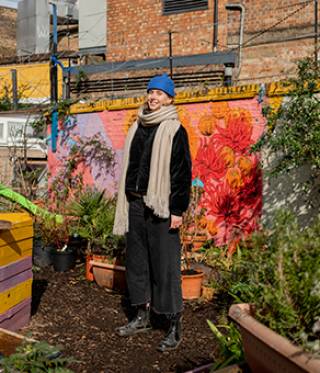Research Title
Urban Seed Systems: An exploration of seed saving practices within migrant and diaspora communities in London
- More about Helene
Education
- 2022- current University College London: PhD Candidate Urban Seed Sovereignty: An exploration of seed saving practices in London
- 2016 - 2017 University of Oxford: MSc Nature, Society and Environmental Governance Dissertation: Public and private temporalities of seed saving practices in the UK
- 2014-2015 University of California, Berkeley
- 2012 – 2016 UCL BA International Geography First Class Dean’s List of the UCL Faculty of Social and Historical Sciences for best overall performance
Work
- 2023-current: Editor, The Preserve Journal
- 2019- current: Co-director, Garden of Earthly Delights, Hackney
- 2017-current: Co-director, London Freedom Seed Bank
- 2020- 2022: Regional coordinator, Seed Sovereignty Programme
- 2020-2022: Communications officer, Food Ethics Council
- 2018-2020: Coordinator, writer, editor, Agricultural and Rural Convention
- Research Interests
London’s gardens, balconies and allotments are brimming with a multiplicity of often unexpected vegetal life. This diversity is cultivated by urban seed savers, bringing in and exchanging the seeds of unusual, rare or hard-to-find vegetable, herb and flower varieties. These are grassroots, community-led practices performed in the shadow of large-scale, national and international seed banking projects. In London, much of this work is performed by first, second or third-generation migrants or within diaspora communities, growing and exchanging plant varieties with origins all over the world.
My research explores why and how these communities are saving and sharing seeds in London and what this might tell us more broadly about how seeds move into and through London in ways that circumvent traditional economic exchange and border regimes. It seeks to understand how migrant and diaspora identities manifest in the gardens of London, how plant biodiversity is entangled with cultural or ethnic diversity through the practice of saving and sharing seed and question what role urban seed systems might play in building more resilient and liveable cities.
What we grow in urban spaces matters and how we acknowledge and consider those cultivating these spaces matters also. Plant conservationists have been traditionally thought of as botanists, scientists and other professionals engaged in field or lab work on behalf of or within large institutions and botanical gardens, fields of study deeply entangled with colonial dominance and colonial wealth. This is one part of this work. The other is the more grassroots actors, quietly and often secretly bringing in and building urban biodiversity through the saving and sharing of seeds. What grows in London often has origins in far-flung places, brought in as part of a colonial regime, or in the years since by enthusiastic growers, bringing in the seeds which matter to them and growing them out over generations in London soils, complicating a perhaps too easy ‘native/ non-native’ binary categorisation which dominates much of how we think about acceptable nature in the city.
This research wants to challenge these categories of ‘conservationist,’ and ‘acceptable nature’, exploring the more complex identities and practices which underpin work with seed in the city. A xenophobic turn in European politics has reorganised and strengthened border controls and much political discourse has focussed on urban conflict and disconnection. Can an analysis of urban gardens, their seeds and their savers offer alternative stories about convivial nature in and of the city? Could a revaluing of such spaces and actors play a role in building more liveable cities? That is what my research seeks to understand.
 Close
Close


